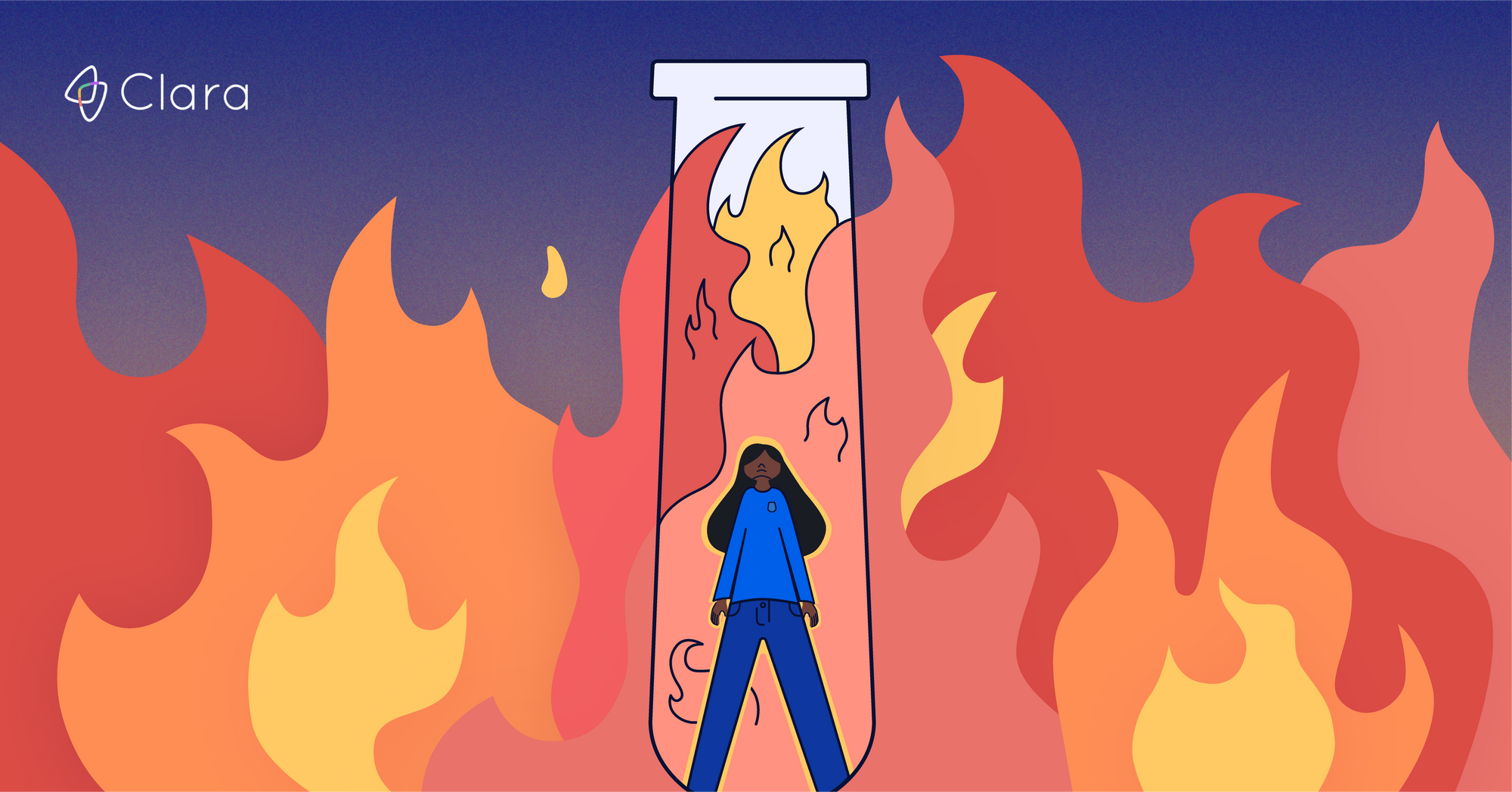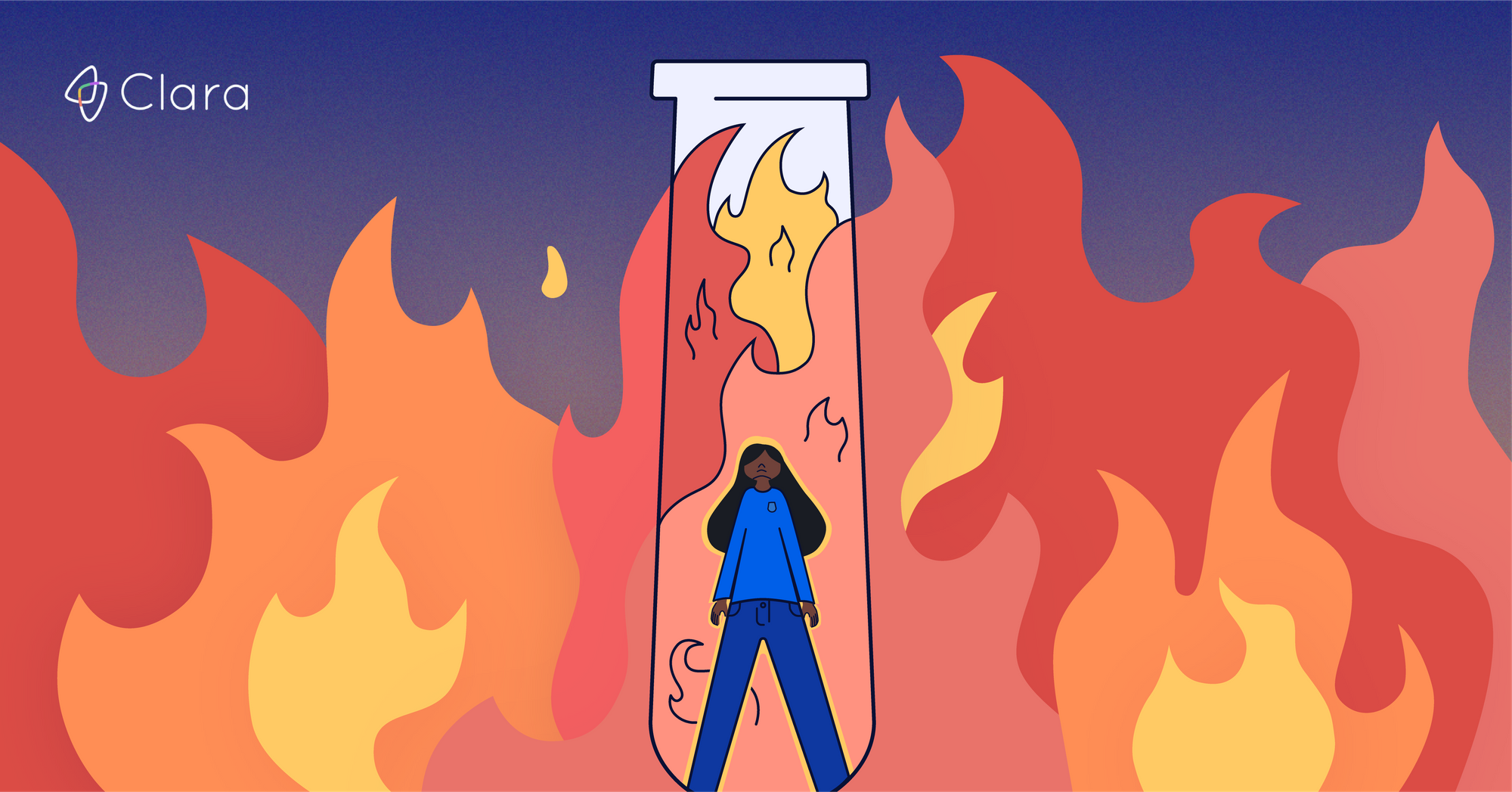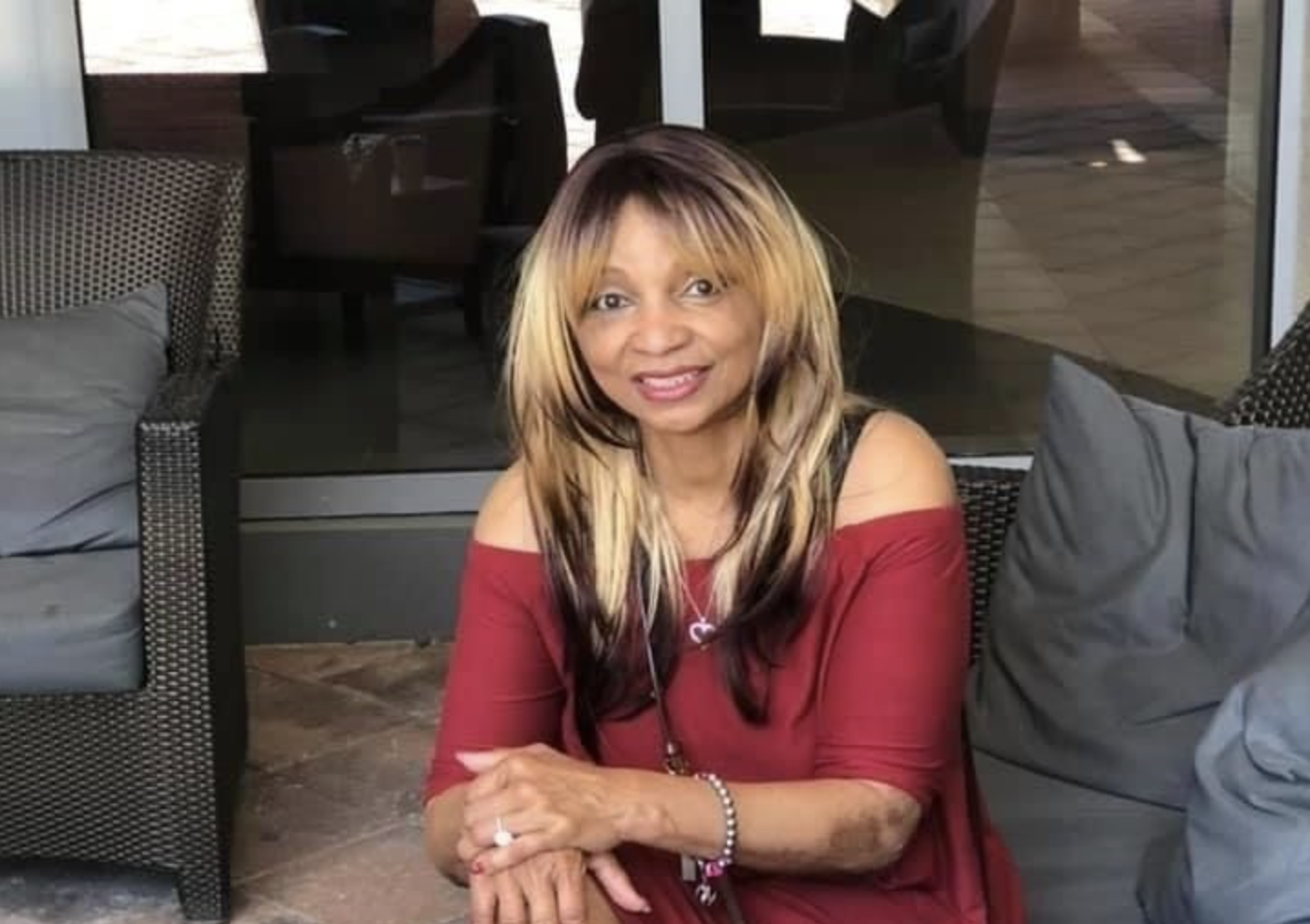Our latest Patients Have Power episode is called "The Luckiest of the Unlucky," (You can subscribe to the podcast at Apple Podcasts, or listen to it with the media player above).
In this episode, I had the absolute pleasure of sitting down with Michele Rhee, Enzyvant’s Head of Patient Affairs. A simple job title doesn’t quite do her story justice: Michele’s road to patient advocacy involves a cancer diagnosis, a collapsed lung, a heart tumor, tears shared with her mother, and a fight to get the treatments that she knew she needed.
And now, she uses all the experience she gained through her life as a patient and an advocate at Enzyvant. Michele and the Enzyvant team work to find a treatment for Farber disease, a rare disease that has about 80 reported cases world-wide [1], through patient engagement and education.
We chat about how much she loves her work, how lucky she feels, and the power of a story to change the world. Michele is one of my role models in patient advocacy and I think you’ll see why as you listen to our chat!
- Zielonka, M et al. Genetics in Med. 2017; a cross-sectional quantitative analysis of the natural history of Farber disease
This is a sponsored podcast.

Lilly Stairs: Hello, everyone and welcome to The Patients Have Power Podcast. Today I have the beautiful Michele Rhee with us. Michele is one of my favorite people in the world. She's an incredible patient advocate that I really consider a mentor in my journey as a patient advocate.
Her journey inspired her to pursue a career in patient advocacy. She actually has an incredible patient story. Cancer saved her life. Is that right, Michele?
Michele Rhee: Yes, that is correct. And thank you for that fantastic introduction also. I'm sort of blushing. I appreciate that so much, and I think getting to work with Lilly has been fantastic too. But anyone who knows Lilly, she's an amazing patient advocate.
Lilly Stairs: Thanks, Michele. It's a little love fest.
Michele Rhee: I know. The first few seconds of this is just like us loving on each other.
Lilly Stairs: People are going to be like "um...fast forward!"

Michele Rhee: Yeah. I have an odd patient story, but I think it's a lucky one, so I like describing myself as sort of the luckiest of the unlucky or the unluckiest of the lucky, depending on how you look at it, because I was diagnosed with thyroid cancer when I was 20. So it was my junior year of college.
The joke is if you have to have cancer and you get to pick, pick thyroid cancer because it's one of the most treatable cancers. And actually within, I think it was, seven or eight months of being diagnosed I was actually in remission.
Lilly Stairs: No way. I didn't realize ...
Michele Rhee: Yeah.
Lilly Stairs: ... it was that quick.
Michele Rhee: It was very quick. And I was very, very lucky. I realize how lucky I was. And I'm so grateful for it. But in the follow-up care and just tracking to make sure it hadn't come back, they do scans of your lungs because that's one of the first places thyroid cancer can spread. And these little spots were popping up in my lungs, these nodules, which is not a good sign.
Lilly Stairs: You generally want clear lungs.
Michele Rhee: Exactly. And so they kept on scanning, kept on checking. And I remember over the months as they were just watching them, we eventually got to a point where they had to do a lung needle biopsy to actually get a sample of the tissue to see if it was cancer or not. And ...
Lilly Stairs: That sounds kind of painful.
Michele Rhee: Well, it's not fun. I actually ... The way that they do it is they sort of sedate you but not asleep. Like you're awake but they sedate you a little bit and numb you and put you in a weird kind of CT scanner that's spinning around you while they're doing the biopsy so they can see where to poke you.
Michele Rhee: And I remember this, because my doctor's name was Dr. Grimm, G-r-i-m-m.
Lilly Stairs: Oh, no.
Michele Rhee: And it was this horrible feeling that things were going to go wrong. And they said, "There's very low likelihood, but this one thing might happen, you might end up with a collapsed lung." And that is what happened.
Lilly Stairs: No.
Michele Rhee: So they got the tissue sample, but I did end up with a collapsed lung. I ended up in the hospital. But the sedation, for whatever reason, made me really loopy, so I kept on singing to everyone. And ...
Lilly Stairs: I can picture that.
Michele Rhee: Right. I know. It seems very in line with me as a person.
But I ended up being in the hospital with this collapsed lung, and the tissue was undiagnosable. They couldn't tell what it was. And so the only option to diagnose me at that point would be to actually take out a bigger piece of my lung.
At that point I had had ... I was still in my junior year of college, and in order to have that major type of surgery, I was going to have to leave school. And so we really didn't want to have to do that.
So we got a second opinion. And that doctor said that I would have to have a piece of my lung taken out. And so I left school and went back to the first hospital where I had had one of my thyroid surgeries. And that luckily was Memorial Sloan-Kettering.
And they took a piece out of my lung on the side, and it was thoracotomy. And so they sort of go into your side through your ribs. Like they kind of spread your ribs apart and kind of like take out a section of your lung, like a slice of cake.

Lilly Stairs: What an analogy.
Michele Rhee: But they were trying to make it seem better, so they're like, "It's a mini-thoracotomy." And I was like, "I mean, it kind of sounds better. Not that much."
And the thing that kind of ... it kind of freaked me out but made it better, it causes a great deal of pain, and obviously you have to go through breathing afterwards and everything. So for this surgery you get an epidural.
Lilly Stairs: Oh, wow.
Michele Rhee: And so I had an epidural and they also cut through a lot of the nerves in your chest because the pain is just very severe. And then just to get into that area to get that tissue, you have to cut through some nerves.
So, they took out a piece of that lung, which happened to be the other lung, not the one that had been collapsed.
Lilly Stairs: They did the wrong side?
Michele Rhee: No. No. They did the right side, because ... I forgot. I'm sorry. When they did the scan right before the surgery, they said, "Interesting ..." I had already had nodules in both lungs, but on this side they said, "Oh your nodules have popped up more, have popped up really quickly." And they said, "Oh, we think they're popping up too quickly to be cancer now."
Lilly Stairs: Oh, no.
Michele Rhee: Again, which is not as comforting as they thought it was going to be. So, you know, they chose the other lung because there were just more nodules ...
Lilly Stairs: Got it.
Michele Rhee: ... clustered there, I guess.
Lilly Stairs: Got it. So now both lungs are taking a beating.
Michele Rhee: Yes. Yes. And I think I had the surgery like on a Monday. And by Friday, because I was so young I just recovered really quickly. So by Friday we were in a really good position where I was able to get discharged.
So I started getting ready and we're looking at the discharge papers and we're really excited. And I remember this now, and I didn't understand fully what had happened, but later on I learned, years later, what had happened.
The doctor came in and pulled my mom outside into the hallway. And when she came back in ... I realize it now because I look back on it ... her eyes were really, really red.
And my mom, English is not her first language.
Lilly Stairs: Okay.
Michele Rhee: So, the doctor explained to me when he came back in, very excited. He was like, "It's not cancer. It's a heart tumor." And again, I think he was excited that it wasn't cancer, but the heart tumor part is very concerning.
Lilly Stairs: Yeah, I would say.
Michele Rhee: And so it turned out there was a benign tumor, so non-cancerous tumor, in the right atrium of my heart. And little pieces of it were breaking off and lodging in my lungs.
Lilly Stairs: Oh my gosh.

Michele Rhee: And that's what was causing the nodules. And if a big enough piece had broken off it would have actually clogged up my heart or clogged up one of the arteries, veins, whatever it might be. I'm not sure. One of the blood vessels and would have killed me.
And they were very impressed that I hadn't died yet because it was six centimeters in diameter.
Lilly Stairs: So you had this experience where had you not received this cancer diagnosis and had you not been follow-up scanned you would have never have found this. And is it a rare disease?
Michele Rhee: It is very rare. I had a right atrial myxoma. Extraordinarily rare. And what was also very unusual was because I had had this thyroid condition and I had this right atrial myxoma, these are very common symptoms of something called Carney Complex or Carney Triad. And that is due to very rare mutation.
And they tested me for that and what they found is, I didn't have the mutation in my blood, but I had it in the tumor tissue. And they couldn't explain it and they don't know why. And so my entire family and I actually all were enrolled in a natural history study and they scanned all of us, took all our genetic information, because they were trying to understand what had happened and what was go.
But for my mother, what I learned years latesr was that she had misunderstood what the doctor had told her, and she thought that the cancer had spread to my heart.
Lilly Stairs: Oh, the poor thing.
Michele Rhee: And she thought that that was the diagnosis. So when I think back on that ...
Lilly Stairs: How heart-wrenching.
Michele Rhee: Yeah. And she held it together really well.
Lilly Stairs: And at that point ... And there is so much talk about this because one, you're looking at this huge barrier between proper doctor/patient, doctor/caregiver communication, and I think about the fact that even when the doctor and the patient or caregiver are speaking the same language there can be confusion. But for there to be an additional language barrier, that must be so difficult.
Michele Rhee: I can't imagine what it was like, because my mother is a doctor.
Lilly Stairs: Is she?
Michele Rhee: She's a doctor, and she still ... Because she was in a frame of mind where her baby is sick and they don't know why. Like why is her baby sick? Her baby ... She's still, even now, she calls me her baby. They didn't know what was wrong with me. They didn't know what was happening. They just knew it was bad. And that fear and that concern, you're never going to be a good place in your mind.
And so she wasn't a doctor at that moment in time. She was a really concerned mother who misunderstood what the doctor was saying to her, and it was horrible for her. And then after that, all the surgeries I had to have afterwards, throughout all of that, there's very little information about right atrial myxomas and about Carney Complex, Carney Triad.
The way the doctor explained it ... He didn't say anything about Carney Complex or Carney Triad at that time, it was just about the right atrial myxoma. So he literally took out ... I forget if it's the back of a page, but there was a white page, a white piece of paper, and he laid it out on the tray that you like have your horrible hospital meals on, and he drew the heart tumor. And it looked like a piece of broccoli would. But because it was on white paper it looked like cauliflower.
And he was explaining like the stalk of the cauliflower was attached to the wall of my heart, and that little pieces of the head of the cauliflower is what was breaking off. So he tried using like visuals to explain it to us.
Lilly Stairs: That makes a lot more sense as you're explaining that to me now, even now.
Michele Rhee: Exactly. And so he tried to explain it that way. But the difference between benign and malignant, even that can be confusing. Because like sometimes you just need a doctor to use the word, "cancer, not cancer." And you know, after he left, my mom and I like, we put me into all the hospital robes and gowns, everything we could to like cover me up, and then we like shuffled around the hospital looking for an empty computer, and then just searched right atrial myxoma, because we didn't understand what it was and we were just trying to get more information, and none of it was good, because all the information was information they learned from dead people, because a lot of people were diagnosed on autopsy because it killed them first.
Lilly Stairs: And that had to have been scary.
Michele Rhee: Yeah.
Lilly Stairs: First of all, because you're seeing people who have died now. But I think it points to this notion that we need to be handing patients more resources when they are initially diagnosed. And I understand it can be difficult when it comes to a rare disease, and we are, I will say, getting better in that space, especially as we have more companies and physicians who are studying rare diseases. And so I think we're starting to see more resources.
I know that's something you do in your work, which is something we need to get into in just a moment. But that you work as part of a pharma company, you work to get educational materials out there for patients so that they have that when they receive a scary diagnosis. It's, "Here is information, and here are the next steps." That is lacking.
Michele Rhee: It really, really is. I think that when someone is diagnosed with a rare disease, with cancer, with anything, the way that I remember it, and it's different for every single person, but the way that it felt for me was like this black hole had opened up inside, and a black hole just sucks everything into it. That's just what happens. But for me, the black hole, the only thing it sucked in was hope and a future. Like that was gone.
And I was so lucky because my cancer was treatable. So hope was able to escape that black hole. My future was able to escape that black hole. And then when I was diagnosed with this really rare benign tumor in my heart, then I was also told in that same breath that that was treatable. They could actually operate and take that out. It was so rare they didn't know whether or not it was going to grow back, so they had to just keep checking, maybe they would have to take it out again.
But at least it was treatable. So even though that black hole opened up, again, it was treatable and I was lucky enough to have that. So I can't even imagine what it's like if you get that diagnosis and you don't even have that hope. Like, if you live on with that kind of black hole inside and ... The reason that I do the work I do and the reason that I love my job and love my company and am so committed is because I don't want anyone to have that black hole. I don't want anyone to live with that black hole. I want to help, make sure that people don't have that, as many people as possible.
Either have some type of option or information, or whatever it is that can help with that black hole that I felt and that I worry that other people feel.

Lilly Stairs: That is so powerful. That is so ... You're going to make me cry.
Michele Rhee: I know. We're just looking at each other like ...
Lilly Stairs: We're crying. Well, and that really goes to ... So Michele works for a company called Enzyvant where she is their Head of Patient Advocacy. And she's worked in patient advocacy for many years now and dedicated her life to this. And it goes to show you these amazingly passionate people who are working in industry, who are working in healthcare, who are so connected to this cause and want to make a difference, want to make an impact and want to support fellow patients.
Lilly Stairs: And it's so, so exciting to see companies bringing in patient advocates to be a part of this and to help support other patients, right? And so you're inside the company. You're championing the patient. You are making these resources available. We were just talking about this. Michele's got all these awesome resources for this ultra rare disease, Farber disease, and has been working to put them together so families don't feel alone when their child receives this diagnosis.
Michele Rhee: Exactly. I think one of the main reasons I came on board at this company was because in part, the disease areas that they're working in, which are the types of diseases where there is such huge unmet need and where I have to imagine the diagnosis comes with that black hole feeling. And like how could you not want to help those patients. Like of course, I would do anything to help those patients and those families.
And then I was also brought on as the fifth person at the company, which to me, is really staggering, that our CEO, Alvin Shih, who is just one of my favorite people in the world, he really did feel that patient advocacy and the patient perspective was vital to the founding of this company. And he has never wavered in that. He is the biggest champion of the patient in this company. And I am so proud to be working with him, for him. He is, I think, the best boss I've ever had.
Lilly Stairs: And it is, it's very meaningful to see a patient advocate brought on this early no matter what, whether you're in biotech, health tech, digital health. If you are building something for patients, you better have a patient alongside you or many patients alongside you every step of the way to make sure that what you are building is the right thing for patients.
Michele Rhee: Absolutely. I think when we look at our disease areas, Farber disease and Complete DiGeorge, for both of them, there is that danger of misdiagnosis, and I do think of it as a danger, because I was so lucky to be diagnosed. Like I say having cancer saved my life because otherwise I wouldn't have been diagnosed and I would have died.
And for every rare disease patient who has been through like a really, weird, complicated diagnostic journey, like you know that sometimes getting the diagnosis helps, because you know something is wrong. You know that there is something that isn't quite right. Even with the cancer diagnosis that I had, I had to fight for that. They kept telling me that it wasn't, that it was benign, that it wasn't cancer.
Lilly Stairs: Really?
Michele Rhee: And I had to fight to get the first surgery. And then they were like, "Oh, our bad."
Lilly Stairs: So how did you muster up that strength to speak up and say, "Hey, I don't think this is right," and there are studies that are going on on this all the time. I'm actually talking about this tomorrow, and the speech I'm giving is that there are these studies that talk about how patients feel like they need to subscribe to the societal construct of the physician kind of being in that patriarchal position and then the patient being in that position where they just have to listen.
Lilly Stairs: How did you, at your young age, how were you able to fight against that?
Michele Rhee: You know, no one has ever asked me that before. I've never thought about it before. I'm trying to think. So what had happened for me, I think for my cancer diagnosis, was the right lobe of my thyroid had been growing over the years, and I had gotten ultrasounds, and I had gotten it biopsied, and it was benign, benign every time, but it just kept growing and kept growing.
But the ultrasounds and biopsies were all like inconclusive, whatever. And so they kept telling me it was benign. But what they didn't tell me until finally at one visit one doctor somewhere said, "If it keeps growing like this it could become cancerous," because just like cells growing.
And I remember just like when I heard that I was like, "Wait. What? This could become cancerous and you're just going to let it keep growing? We're just going to watch this until it's ..."
Lilly Stairs: "Oh yeah, that's fine. We're okay."
Michele Rhee: Yeah. I'm like, "What are you talking about?" And I was like, "So then shouldn't we cut this out? Shouldn't we get rid of it before it becomes cancer?"
And I remember him looking at me and saying, "Well, that would only be for aesthetic reasons." And I think that actually was why I felt the confidence to stand up against that, because I have never been someone who really subscribes to doing things for aesthetic reasons.
And I was completely confident I was not asking these questions and I was not feeling these things for aesthetic reasons. And I had confidence in myself that I knew that I was concerned and I felt worried. And if he felt that the only other reason to do this was for aesthetic reasons, I knew myself well enough that that was not why I was worried.
Lilly Stairs: And that's so important, what you just said. And it sets an example of patient power, and patients taking control of their own health and not making any compromises.
And I appreciate you sharing that, because any time I hear the story of someone else who has had the ability to stand up to their physician and say, "Hey, something's not right. This is my body. Something's not right with me and I need to fight for me."
And I think it's so important that we keep sharing those stories so that we can all empower each other to do that when we need to.
Michele Rhee: Absolutely.
Lilly Stairs: So I want to ask you as we're talking about patient power and as we wrap up this podcast, I want to ask you what does patients have power mean to you?
Michele Rhee: When I think of patients have power, I think of the innate emotional strength in the families that I work with and that I interact with every day.

Michele Rhee: One of the things that I have learned about myself is that I cannot work in my own disease areas. I think I basically have mini emotional meltdowns when I have tried working more closely in my own disease areas.
And the thing, though, is that a patient's personal story has so much power to make change, that when I'm able to tell my own personal story, I know that has so much impact and so much power in and of itself, but I don't have the personal strength to actually work in my own diseases.
And so when I am working with families who have that strength to work in their own disease areas and to advocate for their own disease, for their own family, for their own children, and to combine that with the power of their own story, that's what I think about. The power combined with the strength to work in their own disease area. That, to me, every single day, is remarkable and admirable and something that I really would never be able to do.
Lilly Stairs: Thank you so much for sharing, Michele. Thank you for joining us. You're just the biggest inspiration. I'm so glad. I feel so lucky that we've had the opportunity to work with you and to collaborate with you. Thank you for being such a champion of patients.
Michele Rhee: Thank you for having me. I'm really glad we were able to talk and share this story. And I hope that, if anything, if you feel doubt, if you feel that thing in your gut that is telling you that this isn't right, trust yourself, get that second opinion. And if you're in that diagnostic journey where you have to get more tests, you have to see another doctor, it's horrible. It's terrible. It's painful. But please keep going, because hopefully you will get to that diagnosis. But I also know it's not fun. But I wish you well and I hope that you're doing well.
Lilly Stairs: Thank you, Michele. And thank you all so much for joining us. We will see you again next week on The Patients Have Power Podcast.






